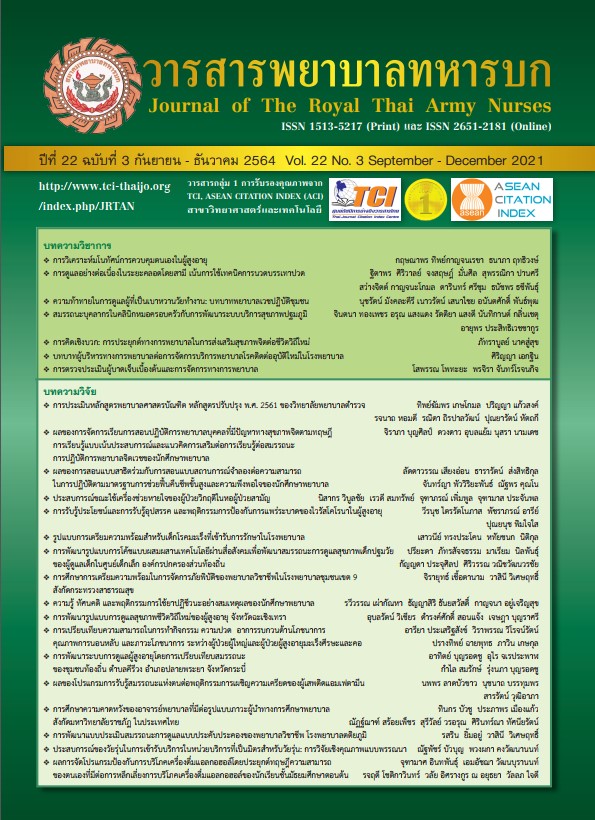การประเมินหลักสูตรพยาบาลศาสตรบัณฑิต หลักสูตรปรับปรุง พ.ศ. 2561 ของวิทยาลัยพยาบาลตำรวจ
An Evaluation of the Bachelor of Nursing Science Program Revised Edition B.E. 2561 of the Police Nursing College
Keywords:
Curriculum Evaluation, Bachelor of Nursing Science Program, Police Nursing CollegeAbstract
The purposes of this evaluative research were 1) to evaluate the Bachelor of Nursing Science Program Revised Edition B.E. 2561 of the Police Nursing College in terms of context, input, process, and product and 2) to analyze future trends of Nursing Science Curriculum and learning management. The population consisted of 32 nursing instructors, 267 nursing students, 68 nursing graduates, and 68 users of the nursing graduates. Informants were 13 administrators of nursing institutes who were purposively selected. The population and informants were 448 people. The research instruments consisted of questionnaires for nursing instructors, nursing students, nursing graduates, and users of the nursing graduates and interview forms for external executives and the administrators at Police Nursing College. They had the content validity indices from 3 experts at 0.95, 0.95, 0.95. 0.97, 1.00, and 1.00, respectively. Quantitative data were analyzed using descriptive statistics. Content analysis was used for analysing qualitative data.
The research findings were as follows: The contextual dimension, the philosophy of the curriculum was apparently consistent with the objectives of the curriculum. The instructors and students’ opinions about the arrangement in each subject of the curriculum were highly appropriate. The input factor dimension, the standard of nursing student selection method was found. The overall nursing instructor’s characteristics in the opinions of the students, graduates, and instructors were at a high level into the highest level (M = 4.45, SD = 0.68; M = 4.22, SD = .96, and M = 4.53, SD = 0.44, respectively). Meanwhile, instructors, students, and graduates’ opinion about the overall sufficiency of the supporting factors was moderately appropriate (M = 3.50, SD = 0.49; M = 3.15, SD = 0.82 and M = 3.12, SD = 0.99, respectively). The process factor dimension: the overall curriculum administration in the opinions of the nursing instructors and nursing students was at a high level (M = 3.90, SD = 0.67 and M = 3.72, SD = 0.79s, respectively), but in the opinions of the nursing graduates was a moderate level (M = 3.13, SD = 0.99). The output dimension: the overall quality of nursing graduates by Thai Qualification Framework and Institutional Identity in the opinions of the users of the nursing graduates was at a high level (M = 4.13, SD = 0.48). The experts and institute administrators’ opinions about the future trends of Nursing Science Curriculum and learning management should focus on outcome-based education that was consistent with the mission of the institution, professional standard, and the social change and needs.
Downloads
References
Office of the National Education Prime Minister’s Office. National Education Act (No. 4) B.E. 2562, Bangkok: Government Gazette; 2019. (In Thai)
Wongyai, W. The higher education development curriculum. 2nd ed., Bangkok: R and Print,printing; 2011. (In Thai)
Ministry of Education. The standard of qualifications for a bachelor’s degree B.E. 2560, Bangkok: Announcement of the Ministry of Education as of 6 November 2017. (In Thai)
Police Nursing College. The Bachelor of Nursing Science Program revised edition B.E. 2561. Bangkok: Police Nursing College; 2018. (In Thai)
Office of Higher Education Commission. Manual for Internal Education Quality Assurance. Higher Education, 2014. (In Thai)
Patphol, M. Curriculum evaluation of learning and development. 3 rd ed., Bangkok: Charansanitwong, printing; 2015. (In Thai)
Aziz S, Mahmood M, Rehman Z. Implementation of CIPP Model for quality evaluation at school level: A case study. Journal of Education and Education Development; 2018, 5(1): 189-206.
Chintapanyakun, T., Ruaengsri, S., Laksana, K., & Lhongsap, P. The New Curriculum Evaluation: Cippiest Model. Journal of Police Nurses; 2017, 9(2), 203-211. (In Thai)
Ritudom, B. An Evaluation of the Bachelor of Nursing Science Curriculum (Revised curriculum, 2012) Royal Thai Air Force Nursing College. Journal of The Royal Thai Army Nurses; 2017, 18(2): 203-211. (In Thai)
Poonchai, S., Arayathanitkul, B., Meeparn, A., Indhraratana, A., Untaja, P., Prasittivejchakul, A., & Chewsothon, S. An evaluation of the bachelor science in nursing curriculum (revised. B.E. 2555) of the Royal Thai Army Nursing College. Journal of The Royal Thai Army Nurses; 2019, 20(2): 380-389. (In Thai)
Soowit, B., Satasuwan, A., Lhaosupab, N., & Jongthammanurak, N. An evaluation of the bachelor science in nursing curriculum (revised edition 2012) Kuakarun Faculty of Nursing Navamindradhiraj University in 2012-2013. Kuakarun Journal of Nursing; 2015, 22(2): 71-90. (In Thai)
Nochit, W., Taweepak, P., Tosem, S., Ratanakomol, P., Karabutr, T., & Nawamawat, J. Comparison on expectation and recognition of quality of graduated nurses based on users’ perception. Journal of Kanchanaburi Rajabhat University; 2019, 8(1): 132-145. (In Thai)
Downloads
Published
How to Cite
Issue
Section
License
บทความหรือข้อคิดเห็นใดใดที่ปรากฏในวารสารพยาบาลทหารบกเป็นวรรณกรรมของผู้เขียน ซึ่งบรรณาธิการหรือสมาคมพยาบาลทหารบก ไม่จำเป็นต้องเห็นด้วย
บทความที่ได้รับการตีพิมพ์เป็นลิขสิทธิ์ของวารสารพยาบาลทหารบก
The ideas and opinions expressed in the Journal of The Royal Thai Army Nurses are those of the authors and not necessarily those
of the editor or Royal Thai Army Nurses Association.






